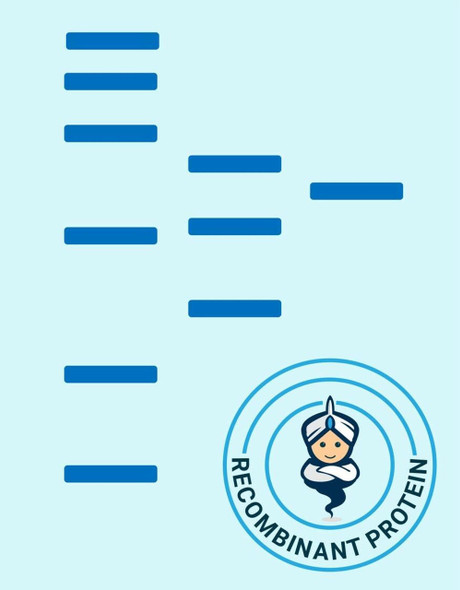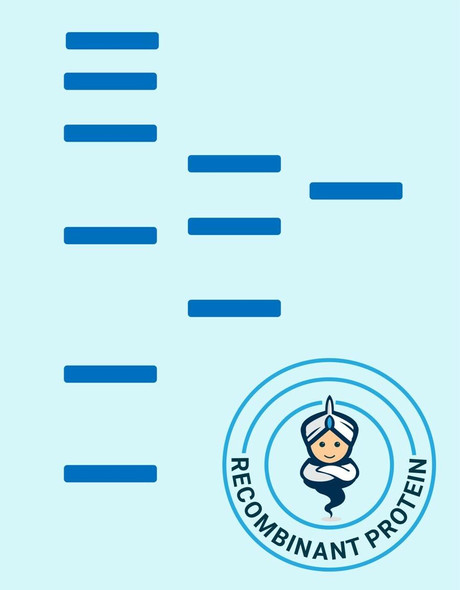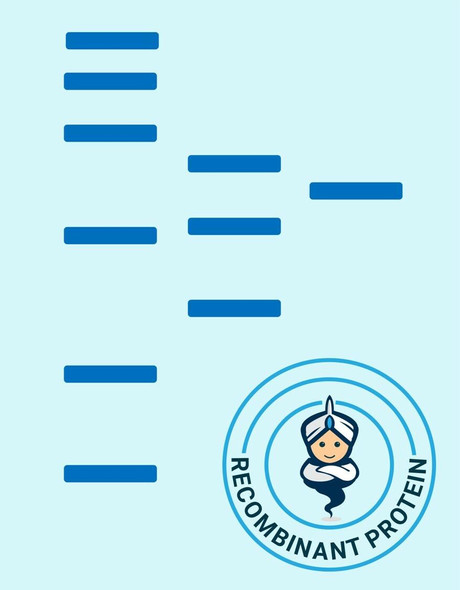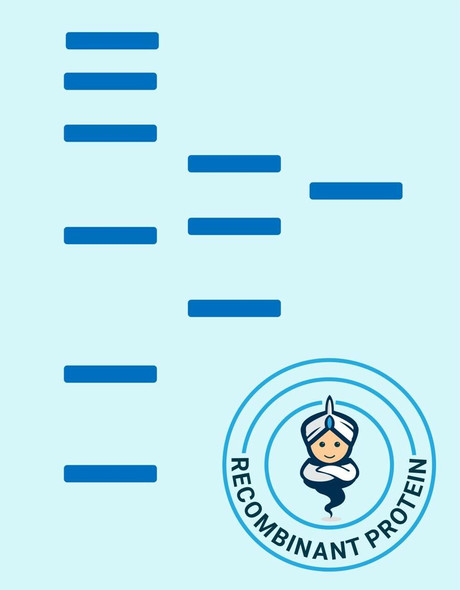Description
| Product Name: | Human F7 Recombinant Protein |
| Product Code: | RPPB3485 |
| Size: | 50µg |
| Species: | Human |
| Target: | F7 |
| Synonyms: | Coagulation factor VII, EC 3.4.21.21, Serum prothrombin conversion accelerator, SPCA, Proconvertin, Eptacog alfa, F7. |
| Source: | BHK cells (Baby Hamster Kidney Cells) |
| Physical Appearance: | Sterile Filtered White lyophilized (freeze-dried) powder. |
| Formulation: | The protein 1 mg/ml was lyophilized after from a sterile solution containing 10mg sucrose pH-6. |
| Solubility: | It is recommended to reconstitute the lyophilized Factor-VIIa in sterile 18M?-cm H2O not less than 100�g/ml, which can then be further diluted to other aqueous solutions. |
| Stability: | Lyophilized Factor-VIIa although stable at room temperature for 3 weeks, should be stored desiccated below -18°C. Upon reconstitution Factor-VIIa should be stored at 4°C between 2-7 days and for future use below -18°C.Please prevent freeze-thaw cycles. |
| Purity: | Greater than 98.0% as determined by analysis by SDS-PAGE. |
| Biological Activity: | The potency per mg was tested and found to be 50,000Units/mg. |
Coagulation factor VII is a vitamin K-dependent factor which is essential for hemostasis. It circulates in the blood as a zymogen which is later converted to an active form by factor IXa, factor Xa, factor XIIa, or thrombin by minor proteolysis. Upon activation of factor VII, a heavy chain with a catalytic domain and a light chain with 2 EGF-like domains are generated, and the two chains are held together by a disulfide bond. The presence of factor III and calcium ions further activates the coagulation cascade by converting factor IX to factor IXa and/or factor X to factor Xa. Alternative splicing of factor VII results in 2 transcripts. Defects in coagulation factor VII can cause coagulopathy. Coagulation factor VII initiates the extrinsic pathway of blood coagulation. Minor proteolysis converts factor VII to factor VIIa by factors Xa, XIIa, IXa, or thrombin. Factor VIIa also converts factor IX to factor IXa in the presence of tissue factor and calcium.
Factor VIIa Human Recombinant produced in BHK is a glycosylated polypeptide two-chain dimer consisting of 406 amino acids with a molecular weight of 50kD.The Factor-VIIa is purified by proprietary chromatographic techniques.
| UniProt Protein Function: | F7: Initiates the extrinsic pathway of blood coagulation. Serine protease that circulates in the blood in a zymogen form. Factor VII is converted to factor VIIa by factor Xa, factor XIIa, factor IXa, or thrombin by minor proteolysis. In the presence of tissue factor and calcium ions, factor VIIa then converts factor X to factor Xa by limited proteolysis. Factor VIIa will also convert factor IX to factor IXa in the presence of tissue factor and calcium. Defects in F7 are the cause of factor VII deficiency (FA7D). A hemorrhagic disease with variable presentation. The clinical picture can be very severe, with the early occurrence of intracerebral hemorrhages or repeated hemarthroses, or, in contrast, moderate with cutaneous-mucosal hemorrhages (epistaxis, menorrhagia) or hemorrhages provoked by a surgical intervention. Finally, numerous subjects are completely asymptomatic despite very low factor VII levels. Belongs to the peptidase S1 family. 2 isoforms of the human protein are produced by alternative splicing. |
| UniProt Protein Details: | Protein type:EC 3.4.21.21; Protease; Apoptosis; Secreted; Secreted, signal peptide; Motility/polarity/chemotaxis Chromosomal Location of Human Ortholog: 13q34 Cellular Component: endoplasmic reticulum lumen; extracellular region; Golgi lumen; plasma membrane Molecular Function:glycoprotein binding; protein binding; serine-type peptidase activity Biological Process: blood coagulation; blood coagulation, extrinsic pathway; ER to Golgi vesicle-mediated transport; peptidyl-glutamic acid carboxylation; positive regulation of cell migration; positive regulation of leukocyte chemotaxis; positive regulation of positive chemotaxis; positive regulation of protein kinase B signaling cascade; signal peptide processing Disease: Factor Vii Deficiency; Myocardial Infarction, Susceptibility To |
| NCBI Summary: | This gene encodes coagulation factor VII which is a vitamin K-dependent factor essential for hemostasis. This factor circulates in the blood in a zymogen form, and is converted to an active form by either factor IXa, factor Xa, factor XIIa, or thrombin by minor proteolysis. Upon activation of the factor VII, a heavy chain containing a catalytic domain and a light chain containing 2 EGF-like domains are generated, and two chains are held together by a disulfide bond. In the presence of factor III and calcium ions, the activated factor then further activates the coagulation cascade by converting factor IX to factor IXa and/or factor X to factor Xa. Defects in this gene can cause coagulopathy. Alternative splicing results in multiple transcript variants encoding different isoforms that may undergo similar proteolytic processing to generate mature polypeptides. [provided by RefSeq, Aug 2015] |
| UniProt Code: | P08709 |
| NCBI GenInfo Identifier: | 119766 |
| NCBI Gene ID: | 2155 |
| NCBI Accession: | P08709.1 |
| UniProt Secondary Accession: | P08709,Q14339, Q5JVF1, Q5JVF2, Q9UD52, Q9UD53, Q9UD54 B0YJC8, |
| UniProt Related Accession: | P08709 |
| Molecular Weight: | 49,320 Da |
| NCBI Full Name: | Coagulation factor VII |
| NCBI Synonym Full Names: | coagulation factor VII |
| NCBI Official Symbol: | F7�� |
| NCBI Official Synonym Symbols: | SPCA�� |
| NCBI Protein Information: | coagulation factor VII |
| UniProt Protein Name: | Coagulation factor VII |
| UniProt Synonym Protein Names: | Proconvertin; Serum prothrombin conversion accelerator; SPCA |
| Protein Family: | F7-1 fimbrial protein |
| UniProt Gene Name: | F7�� |
| UniProt Entry Name: | FA7_HUMAN |










